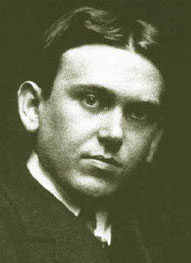
Henry Louis Mencken (1880-1956) was an American journalist, essayist, satirist, cultural critic and scholar of American English.1 He commented widely on the social scene, literature, music, prominent politicians and contemporary movements. His satirical reporting on the Scopes Trial, which he dubbed the "Monkey Trial", also gained him attention. The term Menckenian has entered multiple dictionaries to describe anything of or pertaining to Mencken, including his combative rhetorical and prose style.
As a scholar, Mencken is known for The American Language, a multi-volume study of how the English language is spoken in the United States. As an admirer of the German philosopher Friedrich Nietzsche, he was an outspoken opponent of organized religion, theism, censorship, populism and representative democracy, the last of which he viewed as a system in which inferior men dominated their superiors2. Mencken was a supporter of scientific progress and was critical of osteopathy and chiropractic.
Mencken opposed American entry into World War I and World War II. Some of the opinions in his private diary entries have been described by some researchers as racist and antisemitic3, although this characterization has been disputed. Larry S. Gibson argued that Mencken's views on race changed significantly between his early and later private writings which started when he was 50, and that it was more accurate to describe Mencken as elitist rather than racist4. He seemed to show a genuine enthusiasm for militarism but never in its American form. "War is a good thing," he wrote, "because it is honest; it admits the central fact of human nature. ... A nation too long at peace becomes a sort of gigantic old maid"5.
His longtime home in the Union Square neighborhood of West Baltimore was turned into a city museum, the H. L. Mencken House. His papers were distributed among various city and university libraries, with the largest collection held in the Mencken Room at the central branch of Baltimore's Enoch Pratt Free Library6.
-
"Mencken Dies; Boob-Debunker, Maybe a Biopic?", "Obituaries", Variety, 1 February 1956, pp. 4, 18, 63. ↩︎
-
H. L. Mencken, Notes on Democracy, New York: Alfred A. Knopf, 1926. ↩︎
-
Associated Press, "Mencken Was Pro-Nazi, His Diary Shows", Los Angeles Times, 5 December 1989, accessed 29 May 2024. ↩︎
-
Larry S. Gibson, "H. L. Mencken: Racist or Civil Rights Champion?", Menckeniana, No. 208, Winter 2014, p. 5. ↩︎
-
Quoted in Fred Siegel, The Revolt Against the Masses: How Liberalism Has Undermined the Middle Class, New York: Encounter Books, 2015, p. 25. ↩︎
-
"H. L. Mencken Room", PrattLibrary.org, accessed 30 May 2024. ↩︎
This article is derived from the English Wikipedia article "H. L. Mencken" as of 24 May 2024, which is released under the Creative Commons Attribution-Share-Alike License 3.0.
